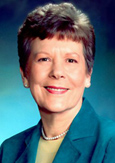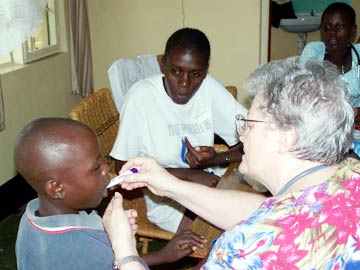Posted: 5/11/07
WOVEN TOGETHER:
Associations’ survival depends
on willingness to change
By Robert Dilday
Virginia Religious Herald
The drive to weave ties among local churches is housed deep in the Baptist DNA, some observers of denominational life say. It’s an instinct almost as visceral as another, often competing, Baptist characteristic—a fierce independence of thought and practice.
|
| Geography is no longer the tie that binds Baptists…. |
For many Baptists, the term “cooperation” carries almost as much theological resonance as “believer’s baptism by immersion” and “priesthood of the believer.” And from their earliest years, Baptists in North America have experimented with congregational links, convinced that what their churches couldn’t do on their own, they could do together.
Nothing personifies that Baptist impetus more than the local association—the fellowship of churches in cities and adjacent counties that some call the basic building block of Baptist coooperation.
As Baptists in America celebrate the 300th anniversary of the local association, many observers think this earliest form of Baptist cooperation has a future—but only if its advocates are willing to make significant changes.
“I think associations are still an important way for churches to cooperate,” said Virginia Baptist mission leader John Chandler. “But the classic organization of associations as geographically based entities in which you collaborate because you live in the same neighborhood—that’s changing.”
Karen Campbell, a consultant with Houston’s Union Baptist Association, said Baptists still believe they can do more together than alone. “But ‘together’ takes on different meanings at different times. … The association in the future will have to continue to read its own context and shape itself accordingly.”
Buffeted by theological controversies, a decline in denominational identity, competition from a widening range of church resources that cuts across denominational lines, economic challenges and a growth in local church-based missions endeavors, some associations are redefining their strategies.
It’s not the first time associations have changed in response to new scenarios. When Baptists on the North American continent formed their first association in Philadelphia in 1707, they were adapting to colonial America a familiar method, already a century old in England.
“Baptist autonomy was foundational for Baptist identity, but in England, Baptists very early formed associations, though they were used in different ways by different Baptist groups,” said Bill Leonard, dean and professor of church history at Wake Forest University Divinity School in Winston-Salem, N.C.
Generally, Leonard said, associations offered fellowship for what was then a dissenting minority in both Britain and its American colonies. Associations communicated with churches, drawing them closer together, and they dealt with theological disputes.
“But they’ve always adapted to the changing nature of Baptist life,” said Leonard. For example, in the mid- to late-19th century, as Baptist numbers in American cities grew and the influence of the social gospel spread, “associations in urban areas took on different kinds of ministries and activities” from their rural brethren.
By the mid-20th century, soup kitchens and rescue missions were common associational ministries in metropolitan areas. Associations also took the lead in temperance movements and evangelistic crusades.
That flexibility in the past is a critical component of associations’ future, say many observers, who see that expressed in different ways.
• Finding a niche. Instead of offering a smorgasboard of church resources—essentially duplicating what many state conventions do—some associations are focusing on one or two specific ministries they do well.
“The move among churches to congregationally-based ministries is like the move toward organic farming,” said Chandler, director of Virginia Baptists’ network for congregational leadership. “Consumers trust more what is grown at home. Churches are much more willing to spend dollars on home-grown mission work instead of ‘purchasing’ mission endeavors from a conglomerate like an association or state or national convention. So, the smart association figures out what the specific needs are in its community and targets it.”
For the Richmond (Va.) Baptist Association, ministry to the inner city has galvanized its 70 congregations—and even some churches beyond its fellowship.
“That’s the glue that holds us together,” said Peter du Plessis, the association’s director of missions. Support for four mission centers in central Richmond and a camp in the Allegheny Mountains that’s home to hundreds of inner-city kids each summer “has driven us to cooperate,” du Plessis said.
“We are a metropolitan, urban-oriented association, and churches that want to make an impact in the inner-city are drawn to us.”
That’s appealed even to Northside Baptist Church in suburban Hanover County, which, while affiliated with another association in its area, sends volunteers to work with neighboring Richmond Baptist Association on specific inner-city ministries.
Meanwhile, churches in the Piedmont Baptist Association, at the foot of the Blue Ridge Mountains in rural Virginia, have coalesced around ministry to growing numbers of Hispanics working the area’s farms.
“Members of Clifford (Va.) Baptist Church didn’t speak Spanish, but they saw an immediate need,” said Chandler. “They didn’t feel equipped to start a service themselves, but going through the channels of the classic associational model, churches in the Piedmont have initiated a very effective weekly worship service for Hispanics.”
Austin Baptist Association has been streamlining its ministries, channeling its resources—and passion—into starting new churches.
“Our focus is considerably narrowed. All we are about as an association is planting churches, equipping churches and keeping that vision alive,” said Steve Washburn, pastor of First Baptist Church in Pflugerville, one of the association’s congregations. “We’ve been gradually weaning ourselves off all other activities.”
Austin Baptist Association began several years ago examining the reason for its existence. The self-analysis and planning process resulted in a revised constitution, new mission statement and limited list of priorities for the association—with church-starting at the top of that list.
Union Baptist Association—the nation’ largest association, with more than 630 churches, follows the same principle, but its size allows it to focus on multiple priorities.
Church planting, community transformation, leadership development, church resources and missions all appeal to some of Union’s congregations, said Campbell, who coordinates communications for the association.
“We were vision-driven before vision-driven was cool,” she said. “We’ve been aware for a long time of the need for a shift in focus for associations.”
• Doctrinal guardians? Associations early took on a role as “doctrinal commentators, if not doctrinal gatekeepers,” Leonard said. “Some of the 18th century associations distributed ‘circular letters’ that functioned as a sort of theological textbook.”
Associations sponsored wide-ranging discussions on vexing theological issues, then they compiled a letter to churches outlining the consensus view.
More recently, associations served almost as entry points for state and national conventions, which informally relied on associations to vet a church’s doctrinal stance before fellowship was offered.
While some associations continue to exclude churches whose position on certain issues—women’s ordination or the appropriate use of alcohol, for instance—are at odds with most of its congregations, that role seems to be diminishing in many areas.
“We try to be very sensitive to who our churches affiliate with nationally and set up our network links with those affiliations,” said Stephen Welch, executive director of the NorthStar Church Network, an association of 170 congregations in Washington’s northern Virginia suburbs. “We try to connect our churches with those they want to affiliate with. We’re not a broker for the affiliates—we’re an advocate for our churches. We want to help them connect with those they want to link with.”
Welch said NorthStar’s churches link with a variety of Baptist groups—the Southern Baptist Convention, American Baptist Churches in the USA, a few traditionally African-American conventions, the Cooperative Baptist Fellowship and several state convention and regional Baptist bodies.
“We reflect baptistic principles rather than a denominational identity,” he said. “We are unquestionably baptistic, but that can be expressed in many regional, state and national ways.”
Associations that focus on responding evangelistically to their communities have less interest in doctrinal uniformity, Chandler said.
“The idea of being a theological gatekeeper puts the emphasis on doctrinal purity rather than evangelistic urgency,” he said. “Where there is an urgency to reach people with the gospel—I won’t say that purity is compromised, but if a house is burning and you want to get things out, you’ll jerk the pictures off the wall in a hurry. Where there’s evangelistic urgency, there’s a higher tolerance for working with people who are different from you and you are enriched by those differences. It’s in those gaps that creativity flourishes.”
A focus on theological unity often gave associations a strong interest in overseeing the ordination of ministers in their region.
“Associations often had significant input into ordinations,” Leonard said. Local-church ordination councils usually included associational representatives.
Now that too is increasingly uncommon. Richmond’s du Plessis says his churches rarely ask for associational representation and evaluate ordination candidates on their own—even though both he and Chandler said associational input likely would help churches as they call out emerging leaders for strategic roles.
• Geography or affinity? Proximity was a standard feature of associations for most of the last three centuries. While the initial Philadelphia Association included churches as far south as Virginia, the impulse to localize was strong. In fact, it came to define associations.
Growing Baptist diversity—as well as communication innovations and ease of transporation—may be breaking down that former key associational characteristic. Many churches are seeking fellowship with congregations with which they share important identifying factors such as size, demographics, culture, theology or mission philosophy.
“Nongeographic associations are developing for a variety of reasons—some theological, some missiological, some ecclesiological,” said Leonard.
Many megachurches—such as Willow Creek Community Church in South Barrington, Ill., and Saddleback Community Church in Lake Forest, Calif.—essentially are nongeographic associations, he said.
Du Plessis said interest in affiliating by affinity hasn’t caused problems in his geographically based association. “We have several churches that are invested in the Saddleback or Willow Creek programs, and that doesn’t affect our relations at all. … The difficulty with affinity alignments is that it encourages us to label folks and put them in one category or another.”
NorthStar’s Welch said alignment by affinity is likely a natural course of events for congregations. “Churches left alone will find other churches that they have an affinity with and network with them,” he said. “Networking by affinity is how they learn and get encouragement, so at an association, we have to do that as well. I know pastors who have mentors who live thousands of miles away from here, and they have support groups that they never see face to face.
“Associations that define themselves by geography probably have the same future as churches that define themselves by neighborhood.”
With its large number of churches, Union Baptist Association combines an appeal to affinity with a geographic base. At least two churches outside of metropolitan Houston—one in Laredo, another in Louisiana—are members of the association, drawn by specific ministries. But the diverse collection of congregations inside Union’s traditional geographic boundaries has prompted it to develop networks based on common interests and outlooks.
“We push the ideas of learning communities,” Campbell said. “Some are based on missional churches, youth work, leadership development, community transformation, Hispanic culture—even hip-hop culture.”
“We call what we do networking among shared purposes and passions, being a clearinghouse for churches, trying to keep our fingers into what is going on,” she said.
In fact, recently Union added a trained futurist to its staff—in response to requests from pastors that the association keep them appraised of developments and trends in culture and technology.
Networking well beyond a church’s environs is really nothing new, Leonard noted. Partly, it’s related to the reemergence in Baptist life of carrying out mission through the societal method—an older practice than cooperating through conventions that allows churches to participate informally in specific projects instead of “buying into whole denominational systems.”
But associational-like entities frequently cooperate in a nongeographic ways—as for instance the decades-long partnership among several moderate Texas Baptist churches that conduct an annual youth summer camp themselves.
“That’s essentially a nongeographic association, and it’s not new and not heretical. It has many precedents in Baptist life,” Leonard said.
The return of the American Baptist Churches USA to a regional approach and the emergence out of the Southern Baptist Convention of the Cooperative Baptist Fellowship, the Alliance of Baptists and more independent-acting state conventions is “the breakdown of highly connectional systems,” Leonard said. “But that doesn’t mean that churches aren’t explicitly adopting their own association-like connections.”
“The idea of cooperation hasn’t lost its meaning,” Campbell of Union Baptist Association added. “It’s just lost how it used to be manifested. It will be manifested in different ways.”
News of religion, faith, missions, Bible study and Christian ministry among Baptist churches, in Texas, the BGCT, the nation and around the world.




